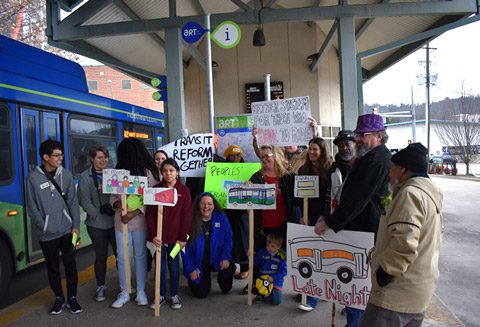This story is featured in the 2019 Hunger Report: Back to Basics
Asheville, North Carolina, is one of the fastest-growing cities in the United States. Its setting in the Blue Ridge Mountains has attracted many retirees, as well as artists, writers, musicians, and tourists from all over the country.
The flip side of Asheville’s popularity is its high cost of living, one of the highest in North Carolina. People who work in the low-wage economy confront the near-impossibility of finding affordable housing within commuting distance of their jobs downtown.
This was the situation in 2009 when city officials unveiled a transit master plan. When people who used the bus system because they couldn’t afford to own a car—often called “necessity” riders—saw the plan, they noticed that their needs seemed to have been forgotten. The master plan eliminated routes in some neighborhoods. It changed schedules in ways that made commuting far more difficult for people who work irregular hours.
The buses did not operate at all on Sundays, a longstanding grievance of necessity riders, especially those who hold late-night jobs. Employers would tell job applicants that there was no point in applying unless they had an alternative to public transportation on Sundays. Cab fare could cost an entire day’s earnings.
City leaders were focused instead on recruiting new riders, people who didn’t usually take buses at all. From their perspectives, this may have been a worthwhile goal. Perhaps it would reduce greenhouse gas emissions and/or improve the transit system’s financial stability. At least in part because patrons who used the bus system regularly were not included in the plan’s development, no one pointed out potential negatives until necessity riders finally saw the plan.
Local advocacy efforts on transportation may be more important than on any other basic need. There is no federal program dedicated to helping low-income households meet their transportation needs, as there is for food security, health care, child care, or housing. Yet housing, child care, and transportation are three of the largest items in a low-income household’s budget.
When policies are made that affect low-wage workers and other low-income people, their voices are rarely heard and their concerns even more rarely understood. Just Economics, based in Asheville, helps people organize to change that. Born out of a successful living-wage campaign in the early 2000s, Just Economics includes a leadership development program, “Voices for Economic Justice,” which has trained hundreds of community activists. The eight-week program culminates in a group project. In 2012, one of the groups decided to focus on the transit master plan.
Over the next year, the group members, all of whom used the bus system “by necessity,” came together as The People’s Voice on Transportation Equality. They met weekly and ultimately produced a 19-point plan, which they submitted to the City Council in January 2014. Just Economics supported the group by paying for transportation, child care, and food for meetings. All of these were important because some activists worked more than one job and had young children to care for.
Group member Calvin Allen explained that he worked the late shift at McDonald’s and often missed the last bus, leaving him with no choice but to walk home. Some nights, following a grueling shift, he was too exhausted to walk and chose to sleep at the bus stop instead.
By the end of 2017, the city had agreed to all 19 points of the reform agenda. In addition to proposals on routes and service hours, the points included a requirement that necessity riders be represented on the city’s transit committee, and changes in the rules to better meet the needs of low-income riders. For example, the agenda called for an end to the policy that a rider could bring only three bags of groceries on the bus, because this meant that many riders had to spend extra time and money making multiple supermarket trips every week.
Getting all 19 points accepted by city government was a major accomplishment. But even more than the policy victories, the campaign by the People’s Voice on Transportation Equality was a resounding success because it proved that people living with poverty can get government to respond to their needs and priorities. Empowerment is a word often used lightly, but being able to silence the voice in a person’s own head—repeating the discouraging thought that policymakers will never listen to her, a poor person—is what empowerment really means.



